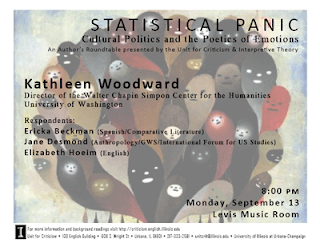9/13 Author's Roundtable 1: Kathleen Woodward, Statistical Panic
Guest Writer: Michael Simeone
Thursday, September 16, 2010
posted under
digital
,
digital humanities
,
emotion
,
Kathleen Woodward
,
Michael Simeone
,
Statistical Panic
by Unit for Criticism


[On Monday, September 13, the Unit for Criticism held the first of its Fall 2010 Author’s Roundtables, hosting Kathleen Woodward who discussed her book, Statistical Panic: Cultural Politics and the Poetics of Emotions (Duke 2009). Below guest writer Michael Simeone provides an overview of the event. (A second post below includes the work of all three respondents]
Written by Michael Simeone (English)
One of the most gratifying aspects of Woodward’s recent work is its inclusive mode of argumentation. During the September 13, 2010 presentation and following discussion, there was a current that went through the room as audience members and respondents alike began connecting their own experiences and observations with Woodward’s overall framework of emotions, subjectivity, and statistics. Woodward mentioned repeatedly that the tone of her book was not so much an assertive argument meant to displace an existing perspective, but rather one that would be associational, inviting, and agglomerative. It seems to have worked.
But one connection between Woodward’s work and the present tense tended to repeat: the conventions of scholarly publishing. Academic writing has become increasingly emotionless and de-personalized, she argued, consonant with the impoverishment of human emotional interiority in the face of neo-liberal capitalism. For Woodward, there are no emotions in articles, no sense of personal stakes in books, making up a pervasive aesthetic of “professional cool.”
Once published by university presses, books and articles go back into university libraries, where they remain guarded from the non-academic public. Accessing an article on JSTOR or checking a book out from the main stacks requires a University ID number. That number costs a considerable sum. Even walking into a library resembles walking into airport security; checking items in lockers, scanning identification cards, and passing through a gate of scanners. The end result is a depersonalized discourse accessible to a dismal fraction of the population, which itself may not even enjoy or even prefer the continued banishment of the personal from academic writing.
All of this makes for a discouraging kind of reversed alchemy, where passion and enthusiasm turn into boredom. Scholars who so frequently enjoy what they read, or are so fascinated they commit years of their lives to its study, produce writing that is demanding to produce, gray, and joyless. Woodward’s work suggests that the drain of affect from academic writing is related to the statistical panic of the future of the humanities, brought about by dismal figures that reference anything from short-term job prospects to long-term departmental budgets. Emptying out emotion from academic writing as a response to statistical panic helps produce a binary relationship between reason and affect, a way to combat the empirical persuasion of statistics with the cool power of academic sterility.
But where to go from here, if here is in fact no longer a place where there is less and less human livelihood?
 Woodward mentioned alternative forms of publication such as Vectors and NINES, as possible ways to think outside of current configurations of publication. And while there was little time for her to elaborate, I want to suggest that these forms of publication, forms where authors submit, design, curate, annotate, and publish content online by themselves or through collaboration, not only help to make scholarship more accessible, they also help to reconnect authors with the enthusiasm that motivates their scholarly interest in the first place. Statistical panic in academic writing is a version of the same kind of Cartesian thought about information that motivates (and has motivated) much of U.S. thought about information: information is immaterial, pure, and incorruptible; bodies are immediate, messy, and full of inconvenient or unpleasant emotions.
Woodward mentioned alternative forms of publication such as Vectors and NINES, as possible ways to think outside of current configurations of publication. And while there was little time for her to elaborate, I want to suggest that these forms of publication, forms where authors submit, design, curate, annotate, and publish content online by themselves or through collaboration, not only help to make scholarship more accessible, they also help to reconnect authors with the enthusiasm that motivates their scholarly interest in the first place. Statistical panic in academic writing is a version of the same kind of Cartesian thought about information that motivates (and has motivated) much of U.S. thought about information: information is immaterial, pure, and incorruptible; bodies are immediate, messy, and full of inconvenient or unpleasant emotions.Sterile academic writing, in light of Woodward’s juxtaposition of statistical panic and scholarship, is a version of digital transcendence, the scholar’s version of Neo disappearing gaining immortality as pure data in the networks of the Matrix.

Perhaps, then, it is possible to work backwards. Maybe scholars who produce digital scholarship emerge from anonymity as the personal force that organizes and presents an online exhibit, multimedia article, or annotated collection. Instead of sliding away from view as the cold voice of reason, they are visible as the human force of inclusion, design, and significance. Thus, before they revolutionize the kind of work we do, new forms of publication and scholarship may first revolutionize the way we feel about that work.
1 comments:
Thanks Michael for this excellent recap. I know that folks are sometimes shy about hashing these critical matters out in an electronic medium like Kritik. But I really would love to know (and know that Kathleen would also like to know) what people think of these observations about academic writing: both its mode (emotionally connected or otherwise), and its method of distribution (academic presses, research libraries, subscription-only access to journals.
Post a Comment